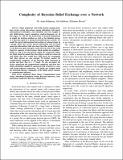| dc.contributor.author | Mossel, Elchanan | |
| dc.contributor.author | Rahimian, Mohammad Amin | |
| dc.contributor.author | Jadbabaie-Moghadam, Ali | |
| dc.date.accessioned | 2018-06-25T17:37:38Z | |
| dc.date.available | 2018-06-25T17:37:38Z | |
| dc.date.issued | 2017-12 | |
| dc.identifier.isbn | 978-1-5090-2873-3 | |
| dc.identifier.uri | http://hdl.handle.net/1721.1/116568 | |
| dc.description.abstract | Many important real-world decision making prob- lems involve group interactions among individuals with purely informational externalities, such situations arise for example in jury deliberations, expert committees, medical diagnosis, etc. In this paper, we will use the framework of iterated eliminations to model the decision problem as well as the thinking process of a Bayesian agent in a group decision/discussion scenario. We model the purely informational interactions of rational agents in a group, where they receive private information and act based upon that information while also observing other people’s beliefs. As the Bayesian agent attempts to infer the true state of the world from her sequence of observations which include her neighbors’ beliefs as well as her own private signal, she recursively refines her belief about the signals that other players could have observed and beliefs that they would have hold given the assumption that other players are also rational. We further analyze the computational complexity of the Bayesian belief formation in groups and show that it is NP -hard. We also investigate the factors underlying this computational complexity and show how belief calculations simplify in special network structures or cases with strong inherent symmetries. We finally give insights about the statistical efficiency (optimality) of the beliefs and its relations to computational efficiency. | en_US |
| dc.description.sponsorship | United States. Army Research Office (grant MURI W911NF-12- 1-0509) | en_US |
| dc.description.sponsorship | National Science Foundation (U.S.). Computing and Communication Foundation (grant CCF 1665252) | en_US |
| dc.description.sponsorship | United States. Department of Defense (ONR grant N00014-17-1-2598) | en_US |
| dc.description.sponsorship | National Science Foundation (U.S.) (grant DMS-1737944) | en_US |
| dc.language.iso | en_US | |
| dc.publisher | Institute of Electrical and Electronics Engineers (IEEE) | en_US |
| dc.relation.isversionof | http://doi.org/10.1109/CDC.2017.8264038 | en_US |
| dc.rights | Creative Commons Attribution-Noncommercial-Share Alike | en_US |
| dc.rights.uri | http://creativecommons.org/licenses/by-nc-sa/4.0/ | en_US |
| dc.source | Prof. Mossel via Michael Noga | en_US |
| dc.title | Complexity of Bayesian Belief Exchange over a Network | en_US |
| dc.type | Article | en_US |
| dc.identifier.citation | Rahimian, M. Amin, Ali Jadbabaie, and Elchanan Mossel. “Complexity of Bayesian Belief Exchange over a Network.” 2017 IEEE 56th Annual Conference on Decision and Control (CDC) (December 2017). | en_US |
| dc.contributor.department | Massachusetts Institute of Technology. Department of Civil and Environmental Engineering | en_US |
| dc.contributor.department | Massachusetts Institute of Technology. Department of Mathematics | en_US |
| dc.contributor.department | Massachusetts Institute of Technology. Institute for Data, Systems, and Society | en_US |
| dc.contributor.department | Massachusetts Institute of Technology. Laboratory for Information and Decision Systems | en_US |
| dc.contributor.approver | Mossel, Elchanan | en_US |
| dc.contributor.mitauthor | Rahimian, Mohammad Amin | |
| dc.contributor.mitauthor | Jadbabaie-Moghadam, Ali | |
| dc.relation.journal | 2017 IEEE 56th Annual Conference on Decision and Control (CDC) | en_US |
| dc.eprint.version | Author's final manuscript | en_US |
| dc.type.uri | http://purl.org/eprint/type/ConferencePaper | en_US |
| eprint.status | http://purl.org/eprint/status/NonPeerReviewed | en_US |
| dspace.orderedauthors | Rahimian, M. Amin; Jadbabaie, Ali; Mossel, Elchanan | en_US |
| dspace.embargo.terms | N | en_US |
| mit.license | OPEN_ACCESS_POLICY | en_US |
